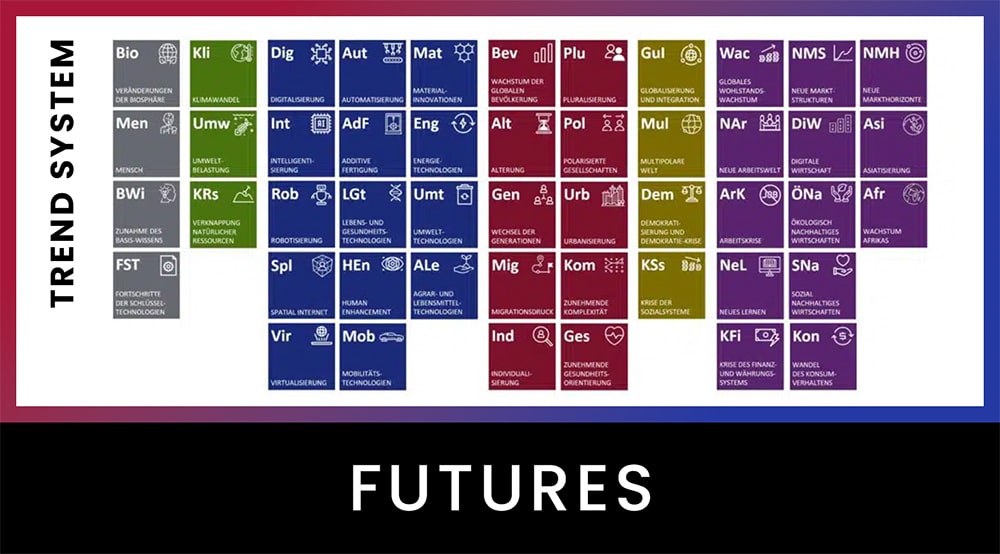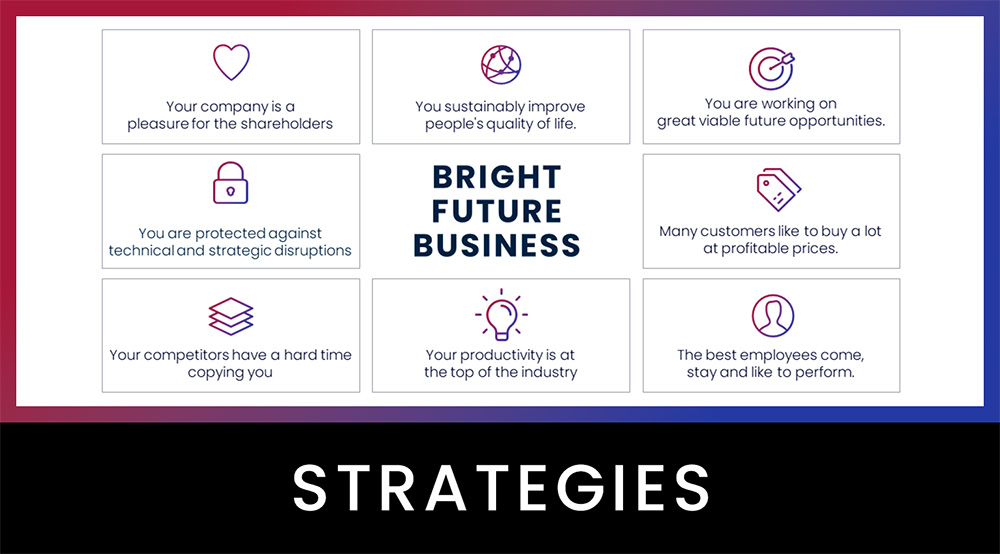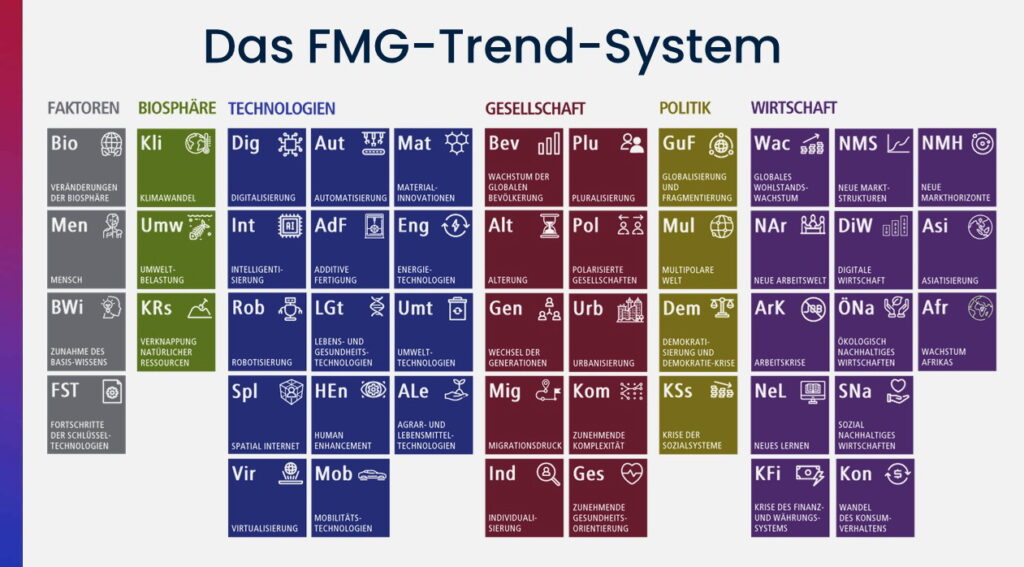Megatrend of increasing health orientation
From the FMG Trend System: For your future-proof company
Health orientation as a central goal in life?
Health has become a central goal in life, not only in our private lives, but also as a strategic success factor for companies. More and more people are striving for physical, mental and emotional balance. The increasing focus on health is reflected in new lifestyles, the growing importance of prevention, a booming market for health technologies and far-reaching social changes. The megatrend affects almost all areas of life: consumer behavior, the world of work, education, family life and ideas about the future. To the overview of all megatrends

What does health orientation mean for companies?
Health is no longer just the responsibility of healthcare systems. It is becoming a competitive factor for companies, both in the customer market and in the labor market. Companies that support healthy lifestyles, create preventive care offerings and provide a working environment that promotes resilience and well-being gain the trust of customers and qualified applicants. At the same time, there is a growing expectation that companies will not only pay attention to physical health, but also promote holistic health, including mental stability.
Health is also becoming a key criterion for employees when choosing an employer. For younger generations in particular, if you want to remain productive in the long term, you need employers who are mindful of stress, ensure balance and take mental health seriously. Companies that promote health not only shape the future viability of their team, but also their attractiveness in the market.
- Societies are changing profoundly, in their structure, their values and their behavior. The megatrend of increasing health orientation is just one of many that could be relevant for the future of your business.
- FMG’s trend system makes these complex social developments tangible.
- In addition to megatrends from society, politics, the economy, technology and the biosphere, it also includes future factors as drivers of change.
- You can find out more about megatrends on our page Overview of all megatrends
Key developments in the increasing focus on health
1. healthier lifestyles
Health is becoming a personal mission. More and more people are making targeted investments in their lifestyle in order to feel fitter, more resilient and more balanced. Instead of fighting illness, the focus is shifting to promoting health, with a major influence on consumer behavior, nutrition, leisure activities and professional expectations.
Subtrends:
Individual deceleration: More and more people are looking for ways to escape the hectic pace of everyday life through mindful routines, conscious eating or slow-movement offers.
Mental hygiene: Mental health is recognized as a prerequisite for performance, with growing demand for relaxation offers, coaching, experiencing nature or creativity.
Quantified self: technology-based self-observation is becoming part of everyday life, with smart watches, apps and wearables helping people to analyze and improve their own health based on data.
Longevity optimization: Methods such as ice baths, nootropics or sleep tracking are aimed at an extended, healthy lifespan.
Nutrigenomics: Genetic profiles and microbiome analyses enable individual prevention and customized nutrition.
Microdosing: Substances such as microdoses of psychedelics are used for emotional stabilization, outside the classic therapeutic pathways.
Regenerative nutrition: Nutrition is seen as a therapeutic tool, with a focus on anti-inflammatory, plant-based and functional foods.
Health-centered work-life blending: exercise, relaxation and nutrition are increasingly being integrated into everyday working life.
2. increase in mental illnesses
Mental stress is increasing significantly, not only in absolute terms, but also in terms of social visibility. The spectrum ranges from excessive demands to clinically relevant illnesses. Mental health is becoming a strategic issue for companies, not least from an economic perspective.
Subtrends:
Cyberchondria: Uncontrolled self-diagnosis via the Internet leads to anxiety disorders, social withdrawal and increasing psychological stress for many people.
Fear of Missing Out (FOMO): The constant fear of missing out drives young people in particular into a permanent state of tension, with potential long-term health consequences.
Always-on exhaustion: Permanent availability and sensory overload lead to mental exhaustion.
Anxiety Economy & Safe Spaces: The desire for anxiety-free zones is fueling new offerings, digitally, physically and in the work environment.
Mental prevention in the world of work: companies respond to mental overload with coaching, flexible working models and retreat areas.
3. increase in diseases of civilization
The “diseases of affluence” such as diabetes, high blood pressure and heart disease no longer only affect older people. A poor diet, lack of exercise and stress lead to chronic illnesses with a massive impact on productivity, quality of life and social security systems.
Subtrends:
Obesity: More and more people (increasingly also in emerging countries) are suffering from morbid obesity with serious medical and economic consequences.
Lack of exercise: Inactivity due to working from home, office life or leisure habits leads to increasing health risks.
Urban Health Gaps: Cities show increasing health inequality, including environmental pollution, stress and gaps in care.
Silent Inflammation: Chronic inflammation is an underestimated cause of many modern ailments.
Everyday inflammation: Sensitivities to certain foods or environmental influences have a negative impact on everyday life and quality of life.
Nutritional dilemma: While overeating is on the rise, there is a lack of micronutrients, even in rich societies.
Digital disease management (DMPs): Apps, sensors and AI accompany chronically ill patients in their everyday lives and improve disease management.
Conclusion: What companies should do now
Health awareness is becoming a permanent expectation, both for customers and employees.
Holistic health promotion not only increases employer attractiveness, but also reduces absenteeism and staff turnover.
Product and service innovations relating to well-being and prevention offer great potential for growth.
Mental health deserves special attention, also as a competitive factor.
With the Future Radar program you will better understand which aspects of the increasing focus on health will be relevant for your business and what future opportunities will become possible.



































